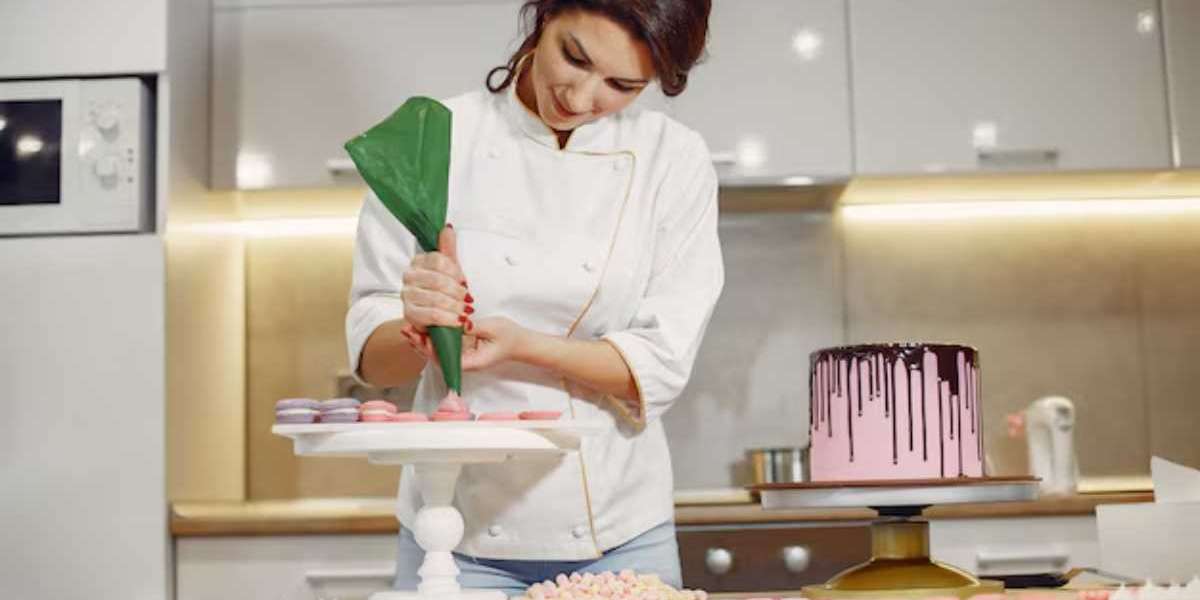Baking cakes is a beloved pastime for many, offering a creative outlet and the satisfaction of crafting delicious treats. However, for those with a deeper passion, cake baking can evolve from a casual hobby into a professional career. The transition from hobbyist to professional baker often requires structured learning, and cake-baking classes provide the perfect platform to make this leap.
These classes offer not only technical skills but also the confidence and knowledge needed to succeed in the competitive world of baking. In this article, we will explore how cake-baking classes can transform a hobby into a profession, what to expect from such courses, and why they are essential for aspiring bakers.
The Value of Cake Baking Classes
Cake baking is both an art and a science. While creativity plays a significant role, a thorough understanding of techniques, ingredients, and processes is crucial for achieving consistent results. Cake baking classes bridge the gap between amateur experimentation and professional precision, offering:
- Expert Guidance: Learn from seasoned instructors who can provide valuable tips, troubleshoot common problems, and share industry secrets.
- Hands-On Experience: Practice skills in a controlled environment with professional-grade tools and ingredients.
- Structured Learning: Progress through a curriculum that covers foundational techniques, advanced methods, and creative designs.
- Networking Opportunities: Connect with other passionate bakers, fostering collaboration and inspiration.
What to Expect in Cake Baking Classes
Whether you’re an absolute beginner or looking to refine your skills, cake baking classes cater to a wide range of experience levels. Here’s what you can typically expect:
- Foundational Skills
- Measuring Ingredients: Precision is key in baking, and classes emphasize accurate measurement techniques.
- Mixing Methods: Understand the science behind mixing methods such as creaming, folding, and whisking.
- Baking Basics: Learn to control oven temperatures and baking times for different types of cakes.
- Advanced Techniques
- Layering and Filling: Master the art of creating even layers and using complementary fillings.
- Structural Integrity: Learn how to assemble tiered cakes with proper support systems.
- Specialty Recipes: Explore unique cake types such as chiffon, sponge, and flourless varieties.
- Decoration and Presentation
- Frosting: Gain expertise in buttercream, ganache, and whipped cream applications.
- Fondant Work: Learn to roll, shape, and apply fondant for a polished look.
- Creative Designs: Practice advanced techniques like piping, stenciling, and airbrushing.
- Business Insights
For those aiming to turn their passion into a career, many classes include business modules that cover:
- Pricing and Cost Management: Learn how to calculate the cost of ingredients and set profitable prices.
- Marketing Strategies: Discover how to promote your baking business through social media, branding, and local outreach.
- Client Communication: Develop skills to interact with customers and fulfill custom orders.
Why Take Cake Baking Classes?
Transforming your baking hobby into a professional pursuit involves more than just perfecting recipes. Cake baking classes provide the essential training to ensure success in a competitive field.
- Skill Enhancement
Even the most passionate hobbyists can benefit from learning new techniques and refining their skills. Classes introduce advanced methods and creative approaches that elevate your baking to a professional level. - Confidence Building
Practical training instills confidence, enabling you to tackle complex designs and large-scale projects like wedding cakes or corporate orders. - Industry Standards
Professional baking demands adherence to health, safety, and quality standards. Classes ensure you’re equipped to meet these requirements. - Creative Inspiration
Exposure to diverse styles and ideas helps you develop your unique baking aesthetic, setting you apart from competitors.
Transitioning From Hobbyist to Professional
The journey from hobbyist to professional baker requires dedication, practice, and a willingness to learn. Here’s how cake-baking classes facilitate this transition:
- Building a Strong Foundation
For beginners, classes offer a structured introduction to baking principles. You’ll gain the skills needed to create consistent, high-quality cakes. - Developing a Portfolio
As you progress through classes, you’ll create a variety of cakes that showcase your range and style. This portfolio can be used to attract clients or apply for professional opportunities. - Networking and Mentorship
Many classes connect students with instructors and peers who can provide guidance and support. These connections often lead to collaborations, job referrals, or mentorship opportunities. - Starting a Business
Classes often include modules on business planning, helping you navigate the process of setting up a bakery or home-based business.
The Benefits of Professional Training
For those aiming to establish a career in cake baking, professional training offers numerous advantages:
- Credibility: Certification from a reputable course adds legitimacy to your skills, boosting client trust.
- Efficiency: Learn time-saving techniques and workflows to handle high-demand situations.
- Innovation: Stay ahead of industry trends by experimenting with new tools, ingredients, and designs.
- Higher Earning Potential: Specialized skills enable you to command higher prices for your creations.
Online vs. In-Person Classes
With the rise of digital learning, aspiring bakers now have the option to choose between online and in-person classes.
Online Classes
- Flexible Scheduling: Learn at your own pace, making it ideal for those with busy schedules.
- Accessible Resources: Access video tutorials, downloadable recipes, and community forums.
- Budget-Friendly: Often more affordable than in-person options.
In-Person Classes
- Hands-On Experience: Practice skills under the guidance of instructors.
- Immediate Feedback: Receive real-time corrections and advice.
- Networking Opportunities: Build relationships with classmates and industry professionals.
Tips for Success in Cake Baking Classes
To maximize your learning experience:
- Be Open to Feedback: Constructive criticism helps you improve and refine your techniques.
- Practice Regularly: Reinforce your skills by practicing at home between classes.
- Ask Questions: Take advantage of your instructor’s expertise by seeking clarification on techniques or concepts.
- Stay Curious: Explore additional resources and experiment with new recipes to broaden your skill set.
- Set Goals: Define what you hope to achieve through the class, whether mastering a specific technique or starting a business.
Conclusion
Cake baking classes in Chennai are invaluable for those looking to turn their passion into a profession. They provide the technical skills, creative inspiration, and business knowledge needed to succeed in the baking industry.
Whether you dream of opening a bakery, becoming a cake decorator, or simply enhancing your craft, these classes offer the tools and support to help you reach your goals. You can transform your love for baking into a rewarding career with dedication, practice, and the right training.







